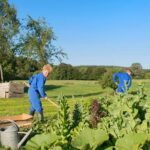Are you looking to start your own organic vegetable garden and don’t know where to begin? Look no further. There are a plethora of resources available in the form of books on organic vegetable gardening that can guide you through the process and help you cultivate a thriving, sustainable garden. Whether you’re a beginner or an experienced gardener, these books offer valuable tips, techniques, and advice to help you grow your own organic produce.
Organic vegetable gardening books provide essential knowledge on how to grow fruits, vegetables, and herbs without the use of synthetic pesticides and fertilizers. These books cover a range of topics such as soil health, composting, pest control, and plant care using natural methods. With the increasing interest in sustainability and healthy living, these resources are becoming more popular among individuals looking to grow their own food at home.
In this article, we will explore the benefits of organic vegetable gardening, as well as provide recommendations for the top 5 books on the subject. We will also delve into detailed reviews of each recommended book and offer tips for choosing the right one for your specific needs.
Additionally, we will discuss common mistakes to avoid in organic vegetable gardening and provide additional resources for those seeking further education on sustainable gardening practices. So if you’re ready to embark on your organic gardening journey, let’s get started.
The Benefits of Organic Vegetable Gardening
Organic vegetable gardening offers a myriad of benefits, from promoting environmental sustainability to producing nutrient-dense and great-tasting crops. One of the primary advantages of organic vegetable gardening is its positive impact on the environment. By avoiding synthetic pesticides, herbicides, and fertilizers, organic gardening helps reduce soil and water pollution, conserves water, and promotes biodiversity. Additionally, organic farming practices also contribute to mitigating climate change by capturing more carbon in the soil.
Furthermore, organic vegetable gardening allows individuals to grow their own food, providing them with access to fresh and healthy produce. This not only reduces their exposure to harmful chemicals found in conventionally grown vegetables but also encourages a healthier diet rich in vitamins and minerals. Studies have shown that organically grown fruits and vegetables contain higher levels of antioxidants and essential nutrients compared to non-organic produce.
Moreover, engaging in organic vegetable gardening can be a therapeutic and stress-relieving activity. The act of tending to plants and nurturing them from seedlings to mature crops has been proven to reduce stress levels and improve mental well-being. Being out in nature and connecting with the earth can provide a sense of calm and fulfillment for many individuals.
| Advantages | Description |
|---|---|
| Promotes Environmental Sustainability | Avoiding synthetic pesticides, herbicides, and fertilizers helps reduce soil and water pollution. |
| Access to Fresh Produce | Organic gardening provides individuals with access to fresh, healthy produce. |
| Therapeutic Activity | Gardening can be a therapeutic and stress-relieving activity that improves mental well-being. |
Overall, the benefits of organic vegetable gardening are numerous for both individuals and the environment. Whether it’s through promoting sustainability or improving personal health, embracing organic gardening can be a fulfilling endeavor for anyone interested in living a greener lifestyle. For those seeking further information on this topic, there are various books on organic vegetable gardening that delve deeper into these benefits while also providing valuable tips for successful garden cultivation.
Top 5 Recommended Books on Organic Vegetable Gardening
When it comes to organic vegetable gardening, having the right resources can make all the difference in the success of your garden. One of the most valuable resources for any organic gardener is a good book on the subject. There are countless books available on organic vegetable gardening, but some stand out above the rest. Here are five highly recommended books that every organic gardener should consider adding to their collection.
The Vegetable Gardener’s Bible by Edward C. Smith
Edward C. Smith’s The Vegetable Gardener’s Bible has long been considered a must-have for anyone interested in organic gardening. This comprehensive guide covers everything from soil preparation and seed selection to pest control and crop rotation. With its clear, concise instructions and beautiful illustrations, this book is perfect for both beginner and experienced gardeners.
Rodale’s Ultimate Encyclopedia of Organic Gardening
For a truly comprehensive guide to all things organic gardening, look no further than Rodale’s Ultimate Encyclopedia of Organic Gardening. This massive tome covers every aspect of organic gardening in great detail and is an invaluable resource for anyone looking to take their garden to the next level.
The Organic Gardener’s Handbook of Natural Pest and Disease Control
No matter how experienced a gardener you are, dealing with pests and diseases is always a challenge. That’s where The Organic Gardener’s Handbook of Natural Pest and Disease Control comes in. This book provides readers with effective, natural solutions for dealing with common garden pests and diseases without resorting to harmful chemicals.
These are just a few examples of the many excellent books on organic vegetable gardening available today. No matter what stage you’re at in your gardening journey, there’s sure to be a book that’s perfect for you. So why not pick up one of these recommended titles and take your organic vegetable garden to new heights?
A Detailed Review of Each Recommended Book
When it comes to learning about organic vegetable gardening, books are a valuable resource. They provide in-depth knowledge, practical tips, and insights from experienced gardeners. In this section, we will take a closer look at each of the top 5 recommended books on organic vegetable gardening.
“The Vegetable Gardener’s Bible” by Edward C. Smith is a comprehensive guide that covers all aspects of organic vegetable gardening. It provides detailed information on soil preparation, composting, pest management, and crop rotation. With clear and concise instructions, this book is perfect for both beginner and experienced gardeners.
Another highly recommended book is “Rodale’s Ultimate Encyclopedia of Organic Gardening.” This extensive reference guide covers everything from basic gardening principles to advanced techniques. It also includes detailed information on specific vegetables, making it a valuable resource for anyone looking to maximize their harvest.
For those interested in biointensive gardening methods, “How to Grow More Vegetables” by John Jeavons is an excellent choice. This book focuses on maximizing yield in small spaces using sustainable practices. It offers an in-depth look at soil building, crop planning, and seed saving.
If you’re looking for practical tips and techniques for extending the growing season, “The Year-Round Vegetable Gardener” by Niki Jabbour is the perfect book for you. This informative guide shares strategies for winter gardening, season extension methods, and choosing the right cold-hardy vegetables.
Lastly, “Carrots Love Tomatoes” by Louise Riotte is a classic companion planting guide that explains how certain plants can benefit each other when grown together. This book offers valuable insights into natural pest control, soil improvement, and overall garden health.
These recommended books on organic vegetable gardening cover a wide range of topics and are suitable for gardeners of all levels. With their valuable insights and practical advice, they are sure to inspire and educate anyone looking to grow their own healthy and delicious produce through sustainable and organic practices.
Tips for Choosing the Right Organic Vegetable Gardening Book for You
When it comes to choosing the right book on organic vegetable gardening, there are a few factors to consider. With so many options available, it’s important to find a book that matches your skill level, gardening goals, and personal learning style. Here are some tips for choosing the right organic vegetable gardening book for you:
- Assess Your Skill Level: If you’re a beginner, look for books that cover the basics of organic gardening, including soil preparation, composting, and pest management. For more experienced gardeners, seek out books that delve into advanced techniques like crop rotation and companion planting.
- Consider Your Gardening Goals: Are you looking to grow a variety of vegetables or focusing on a specific type? Some books may specialize in certain vegetables or provide in-depth knowledge on particular topics such as heirloom varieties or container gardening.
- Preferred Learning Style: Do you learn best through step-by-step instructions with visuals, or do you prefer more theoretical explanations? Take into account whether you need clear visuals, detailed diagrams, or comprehensive text when selecting a book on organic vegetable gardening.
In addition to these considerations, it can be helpful to read reviews and recommendations from other gardeners. Look for books that have received positive feedback from readers who share similar interests and goals as yourself. Finally, don’t hesitate to explore various authors and publishers within the genre of organic vegetable gardening – each may offer a unique perspective or approach that resonates with you.
By taking these factors into account when choosing a book on organic vegetable gardening, you can ensure that you find one that suits your individual needs and preferences. Whether you’re seeking practical guidance for starting an organic garden or looking to expand your knowledge on sustainable growing practices, the right book can be an invaluable resource in cultivating a successful and bountiful garden.
Additional Resources for Organic Gardeners
In addition to books on organic vegetable gardening, there are a variety of resources available to help gardeners cultivate their organic vegetable gardens. Online forums and communities can provide valuable tips, advice, and support from experienced gardeners. Websites and blogs also offer a wealth of information on organic gardening practices, from soil preparation to pest management. These digital resources can supplement the knowledge gained from books and provide ongoing support throughout the gardening process.
Furthermore, local gardening clubs and organizations often host workshops and events specific to organic vegetable gardening. Attending these gatherings can connect gardeners with like-minded individuals, as well as experts in the field who can offer personalized guidance. Many of these events also feature hands-on demonstrations and opportunities to ask questions, making them invaluable resources for those seeking to expand their organic gardening knowledge beyond what is found in books.
Lastly, subscription-based services such as magazines or online courses focused on organic gardening can provide regular access to new information, trends, and techniques. Magazines often contain articles written by experts while online courses offer structured learning experiences led by experienced instructors. These resources can be particularly useful for those looking to stay updated on the latest developments in organic vegetable gardening practices.
| Resource Type | Examples |
|---|---|
| Online Forums & Communities | GardenWeb Forums, Reddit Gardening Community |
| Websites & Blogs | GardeningKnowHow.com, The Micro Gardener Blog |
| Local Gardening Clubs & Organizations | American Community Garden Association, Master Gardener Programs |
Common Mistakes to Avoid in Organic Vegetable Gardening
When starting your journey into organic vegetable gardening, it’s important to be aware of common mistakes to avoid in order to have a successful and bountiful garden. Here are some common pitfalls that you should steer clear of:
- Using synthetic pesticides and fertilizers: One of the main principles of organic gardening is to avoid using synthetic chemicals. Using these products can harm the soil, beneficial insects, and even end up in the vegetables you plan to eat.
- Not planning for crop rotation: Planting the same vegetables in the same spot year after year can deplete the soil of essential nutrients and increase the risk of pests and diseases. It’s crucial to have a crop rotation plan in place.
- Over or under watering: Proper irrigation is vital for a successful organic vegetable garden. Overwatering can lead to root rot and other diseases, while underwatering can cause stunted growth and poor yield.
In addition to these mistakes, not being familiar with companion planting, neglecting soil health, and failing to properly space out plants are all common errors that can hinder the success of your organic vegetable garden. By educating yourself on these potential pitfalls, you can avoid them and set yourself up for a thriving garden.
Remember that knowledge is key when it comes to organic vegetable gardening. By reading books on organic vegetable gardening, you can gain valuable insights into best practices, learn about different techniques for sustainable gardening, and discover tips from experienced gardeners who have successfully grown their own organic produce.
Reading books on this topic will allow you to delve deeper into specific aspects of organic gardening, such as composting, natural pest control, or creating a biodiverse ecosystem in your garden. Whether you’re a beginner or an experienced gardener looking to improve your skills, there are numerous books on organic vegetable gardening that can provide you with inspiration and practical advice.
Conclusion
In conclusion, the importance of education in organic vegetable gardening cannot be overstated. As we have discussed, books on organic vegetable gardening provide valuable information and guidance for both novice and experienced gardeners. The knowledge gained from these resources can help individuals understand the benefits of organic gardening, learn about effective techniques, and avoid common mistakes.
With the wealth of information and resources available in books on organic vegetable gardening, anyone can develop a successful and fulfilling garden. Whether you are interested in learning about composting, companion planting, or natural pest control, there is a book out there that can provide you with the knowledge you need to achieve your gardening goals.
In addition to books, aspiring organic gardeners can also benefit from attending workshops, joining gardening clubs or online communities, and visiting local farms or gardens. By continuously seeking information and sharing experiences with others, gardeners can continue to improve their skills and expand their knowledge of organic vegetable gardening.
So whether you are just starting out or have been tending to your own garden for years, consider picking up one of the recommended books on organic vegetable gardening to hone your skills and grow thriving produce.
Frequently Asked Questions
How Do I Start an Organic Vegetable Garden?
Starting an organic vegetable garden begins with selecting a suitable location with plenty of sunlight. Prepare the soil by adding compost and organic fertilizers to improve its quality. Choose organic seeds or seedlings, and make sure to water and weed regularly to promote healthy plant growth.
What Is the Best Soil for an Organic Vegetable Garden?
The best soil for an organic vegetable garden is loamy soil, which has a good balance of sand, silt, and clay. It should also be rich in organic matter and have good drainage. Adding compost, leaf mold, or other organic materials can further enhance the soil’s fertility and structure.
Is Organic Gardening Worth It?
Many people find that the benefits of organic gardening make it worth the effort. Organic vegetables are free from synthetic pesticides and fertilizers, making them healthier for consumption.
Additionally, organic gardening promotes biodiversity, reduces environmental pollution, and supports sustainable farming practices. While it may require more time and effort compared to conventional gardening, the satisfaction of growing your own healthy produce makes it worthwhile for many enthusiasts.

If you’re looking to get into vegetable gardening, or are just looking for some tips on how to make your current garden better, then you’ve come to the right place! My name is Ethel and I have been gardening for years. In this blog, I’m going to share with you some of my best tips on how to create a successful vegetable garden.





